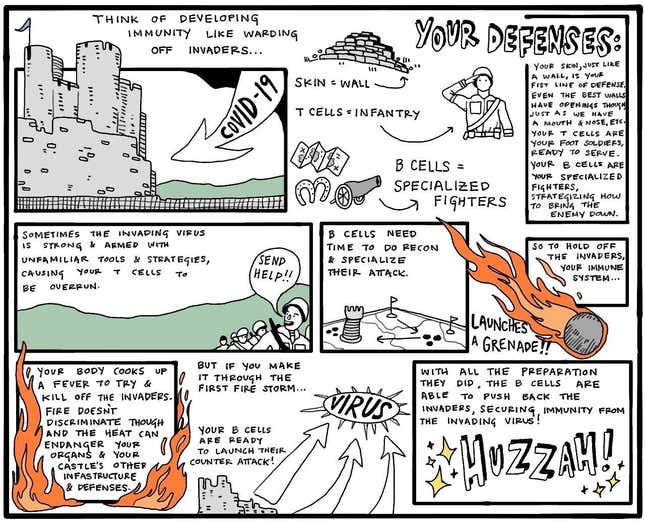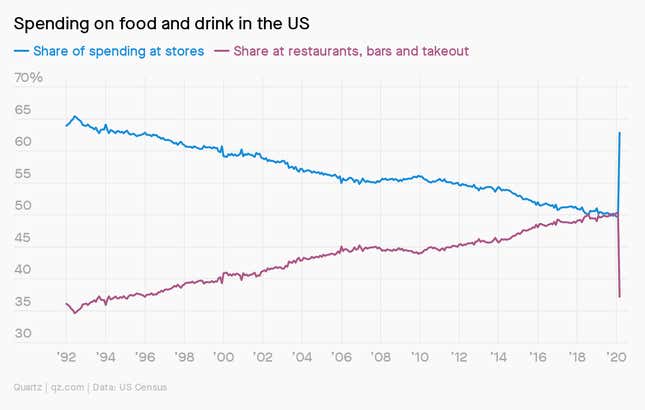Good morning, Quartz readers!
Here’s what you need to know
Where’s Kim Jong Un? A South Korean minister reports that the North Korean leader may be simply avoiding the public eye as a precaution to avoid contracting Covid-19, dampening speculation of his demise.
The United States recorded infection number 1,000,000. While the US continues to report the most confirmed cases globally, some individual states and regions are beginning to ease restrictions. Meanwhile, president Donald Trump is ordering US meat factories to remain open.
India is flexing its medical muscle. The Serum Institute of India—the world’s largest maker of vaccines—announced plans to produce 60 million doses of a potential coronavirus vaccine under development at the University of Oxford. There are roughly 100 vaccines and treatments currently being tested around the world.
Googlers aren’t expected back to work before June. Alphabet CEO Sundar Pichai announced a potential “staggered” return to physical offices ahead of reporting 13% first-quarter revenue growth. Other businesses in Google’s home state of California could reopen with weeks according to the governor.
Russia extended its lockdown… With some 93,000 reported cases, and a shortage of protective equipment for health workers president Vladimir Putin pushed back the country’s emergency measures to May 11.
…while Bangkok looks forward to reopening. As Thailand’s outbreak appears to be slowing down, the capital is planning on gradually reopening businesses in the next few days or weeks.
Another blow lands at SoftBank. After raising nearly $223 million, surveillance technology firm Banjo is under new scrutiny following reports that its founder has a past that includes racist and violent acts. The news drops as SoftBank tries to reposition itself as a late-stage late-stage bargain-hunter.
My body is a castle
Scientists only became aware of the novel coronavirus late last year. Most of our immune systems, meanwhile, have still never heard of it. For now, we have to rely on our bodies—rather than a vaccine or targeted medication—to fight off the virus.
In order to slow the spread of Covid-19, it will be crucial to understand exactly how the immune system tackles the disease. If you’re thinking “Man it’d be helpful to see that as a comic strip,” don’t worry.

For an even closer look at the big unknowns surrounding the topic of immunity, sign up for the free Coronavirus: Need to Know newsletter.
Join Quartz at Work this Thursday for “Career Building in Quarantine.” More people are job hunting than ever right now. In this one-hour workshop, a group of experts will teach you to stand out and continue to build a meaningful career while in quarantine. Click here to register.
Charting the American grocery shopper
The share of food spending at restaurants and bars (including takeout) has been slowly rising for over half a century. In 1970, only about one-quarter of US household expenditures were spent on eating out. By the beginning of 2020, that number had reached about 50%.
The Great Recession slowed down the move to eating out from 2008 to 2012, but only a pandemic could truly reverse the trend with store-bought food amounting to almost 63% of US consumption last month.

For Quartz members
Check out Quartz membership with a ✦ seven-day free trial
- Home fitness is booming, as millions of people look at their computer screens to exercise. We explore how the mental and emotional aspects of online group classes stack up against the IRL kind.
- India and China may avoid a recession. Former Reserve Bank of India director Vipin Malik discussed what’s needed to get the world’s most populous economies firing on all cylinders.
- A place to gather and gossip. Quartz fashion reporter Marc Bain looks at how the temporary loss of barbershops and salons cuts much deeper than appearances.
We’re obsessed with voicemail
Why does voicemail make us feel so awkward? Leaving a message at the beep has sunk more than a few celebrities into scandal, but psychologists say that for the rest of us, that feeling of anxiety has more to do with being alone and on the spot. Voicemail is so fraught that AT&T initially rejected the technology for fear that it would make business people abandon phones. Get the message with the Quartz Daily Obsession.
You asked about climate and coronavirus
What impact is the pandemic having on the climate emergency? It’s no less urgent once we’re reasonably past this crisis. – Ann
Thank you, Ann, for this fantastic question. The economic shutdown associated with coronavirus has taken a huge bite out of global greenhouse gas emissions. According to a recent analysis from the UK-based research outfit Carbon Brief, it could add up to the largest one-year drop in emissions in history.
That’s an astounding reversal. But it reveals a stark reality: Even sustained emissions reductions on this scale wouldn’t be enough to limit global warming to goals set out in the 2015 Paris Agreement. Once total shutdown conditions relax in the next month or two, emissions are likely to jump right back to business as usual. And depending on what kind of stimulus measures governments put in place after the pandemic, emissions could grow even faster than before.
✉️ Do you have a burning question about how coronavirus is changing the world?
Surprising discoveries
A cheaper alternative to divorce. A Japanese startup named after the phrase “corona divorce” is offering short-term rentals for couples to give each other space during shelter-at-home orders.
An odd theory about cigarettes. Smoking is clearly unhealthy, but scientists are exploring the hypothesis that nicotine in tobacco may have helped some smokers suffer less from Covid-19.
Live-action role-playing for science. By crafting historically accurate weapons and hurling themselves into combat, these folks are uncovering Bronze Age battle secrets.
The Romans invented recycling. Excavations at Pompeii show that mounds of rubbish piled outside city walls were collected, sorted, and resold.
Australia is training animal disease detectives. Veterinarians will learn how to identify new pathogens in animals with a nose toward preventing a future pandemic.
Our best wishes for a productive day. Please send any news, comments, bronzed battleaxes, and coronavirus cartoons to hi@qz.com. Get the most out of Quartz by downloading our app on iOS or Android and becoming a member. Today’s Daily Brief was brought to you by Max Lockie and Patrick deHahn.